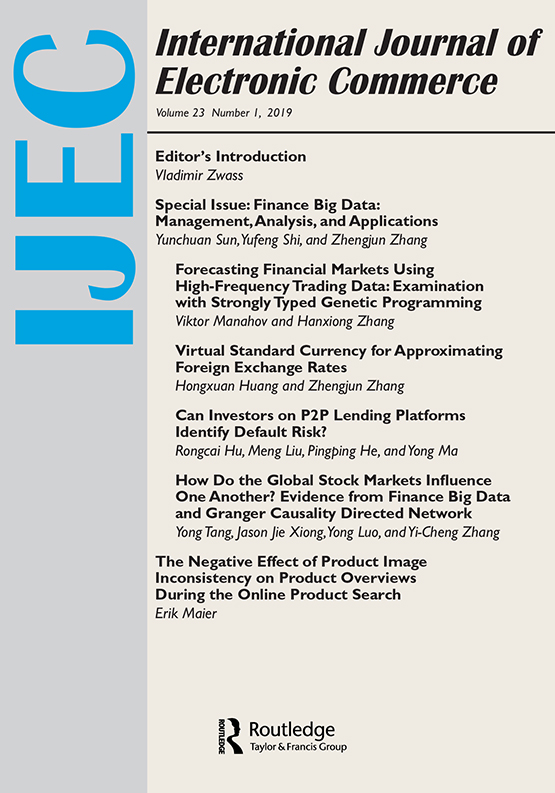编辑简介
IF 3.8
3区 管理学
Q2 BUSINESS
International Journal of Electronic Commerce
Pub Date : 2022-10-02
DOI:10.1080/10864415.2022.2123643
引用次数: 1
摘要
互联网的力量很大程度上来源于它为集体行动提供的能力。因此,人们可以在政治领域部署互联网,特别是在自下而上的组织聚合中,以及各种规模、组织和目标的集体的持续活动中。这种权力也体现在社会商业和集体共同创造经济价值中。基于互联网的集体行动得到了无数社会网络和相关系统的支持,这些网络和系统有助于产生价值,并可能破坏现有的价值网、现有的经济安排,以及在许多情况下破坏现有的社会秩序。值得注意的是,创新和知识共享社区可以共同创造经济价值,从代表独立贡献者自主行动的社区,到由品牌赞助并让其产品用户参与的社区。本期《国际电子商务杂志》的两篇文章探讨了这些社区的运作。在第一篇文章中,曾庆峰、张兰兰、郭倩、庄伟和范伟国在一个由大型手机制造商赞助的社区中对影响创意选择的因素进行了实证研究。基于说服理论,作者部署了一个庞大的用户想法数据库,以确定导致选择其中一些想法的因素。值得注意的是,在其他因素中,情绪表达的作用以及提出的想法。研究结果将有助于开发一个有纪律的、部分自动化的选择过程,包括在其中一个切向因素会使有价值的想法的选择变得模糊的情况下进行去偏倚。当然,所选想法的质量取决于可供选择的想法库。反过来,这首先取决于用户对开放创新社区的参与。在下一篇文章中,Sohaib Mustafa和Wen Zhang对用户参与技术与非技术问题和答案社区进行了实证研究。作者运用模糊集定性比较分析技术来揭示最大参与度的条件。对于这两种类型的社区来说,所揭示的条件是重叠的,但又不同。然而,在这两种情况下,社会互动都是建立和维持它们的关键。正如在引言的开头所说,互联网的力量在很大程度上是集体行动。默认设置在许多虚拟大厅和计算领域,尤其是电子商务领域,具有强大的功能,但由于无法识别,因此往往是阴险的。它们经常保持不变,这让安全专家和雇佣它们的公司感到懊恼。在这里,Efthalia Dimara、Emmanuuela Manganari、Evangelos Mourelatos和Nikos Michos实证研究了三种潜在违约对接收(或不接收)品牌电子邮件通信的差异影响。在他们进行的三项研究中,研究人员一方面调查了消费者个性和情绪以及默认选项(选择加入、选择退出和强制选择)的交互影响。你会发现选择加入选项的有效性令人惊讶。国际电子商务杂志2022,第26卷,第4期,413–414https://doi.org/10.1080/10864415.2022.2123643本文章由计算机程序翻译,如有差异,请以英文原文为准。
Editor’s Introduction
Much of the power of the Internet derives from the capability it furnishes for collective action. Thus, people may deploy the Internet–Web in the realm of politics, notably in a bottom-up aggregation for organization and continuing activity of collectives of a great variety of sizes, organizations, and objectives. Such power is also reflected in social commerce and in the collective co-creation of economic value. Internet-based collective action is supported by myriad social networks and allied systems that help produce the value and may disrupt the existing value webs, existing economic arrangements, and—as in a number of cases—the existing social order. Notably, economic value may be co-created by the innovation and knowledge-sharing communities, ranging from those autonomously acting on behalf of independent contributors, to the communities sponsored by brands and involving the users of their products. Two articles opening the present issue of the International Journal of Electronic Commerce investigate the operation of such communities. In the first of these, Qingfeng Zeng, Lanlan Zhang, Qian Guo, Wei Zhuang, and Weiguo Fan present their empirical study of the factors that influence the idea selection in a community sponsored by a major manufacturer of mobile phones. Grounding themselves in persuasion theory, the authors deploy a large database of user ideas to determine the factors that led to the selection of some of those for adoption. Notable here, among other factors, is the role of the emotion expressed along with a proposed idea. The results will help in developing a disciplined, and partly automated, selection process, including debiasing in the cases when one of the tangential factors would cloud the selection of a worthy idea. The quality of the selected ideas depends, of course, on the pool of ideas to select from. This is, in turn, conditioned in the first place by the participation of users in the open innovation community. In the next article, Sohaib Mustafa and Wen Zhang present an empirical study of user participation in technical versus nontechnical questions-andanswers communities. The authors deploy the technique of fuzzy-set qualitative comparative analysis to surface the conditions for maximum participation. The revealed conditions are overlapping, yet different, for these two types of communities. However, in both cases social interaction is key to building and sustaining them. As said at the opening of this introduction, the power of the Internet is to a large degree in collective action. The default settings have great power, often insidious as they are unrecognized, in many virtual halls and corners of computing in general, and e-commerce in particular. They remain very often unchanged, to the chagrin of security experts and firms that employ them. Here, Efthalia Dimara, Emmanouela Manganari, Evangelos Mourelatos, and Nikos Michos empirically study the differential effects of three potential defaults in receiving (or not) e-mail communications from brands. In three studies they conducted, the researchers investigate the interaction effects of the consumer personality and mood on the one hand and the defaults options (opt-in, opt-out, and forced choice) on the other. You will find the effectiveness of the opt-in option surprising. INTERNATIONAL JOURNAL OF ELECTRONIC COMMERCE 2022, VOL. 26, NO. 4, 413–414 https://doi.org/10.1080/10864415.2022.2123643
求助全文
通过发布文献求助,成功后即可免费获取论文全文。
去求助
来源期刊

International Journal of Electronic Commerce
工程技术-计算机:软件工程
CiteScore
7.20
自引率
16.00%
发文量
18
审稿时长
>12 weeks
期刊介绍:
The International Journal of Electronic Commerce is the leading refereed quarterly devoted to advancing the understanding and practice of electronic commerce. It serves the needs of researchers as well as practitioners and executives involved in electronic commerce. The Journal aims to offer an integrated view of the field by presenting approaches of multiple disciplines.
Electronic commerce is the sharing of business information, maintaining business relationships, and conducting business transactions by digital means over telecommunications networks. The Journal accepts empirical and interpretive submissions that make a significant novel contribution to this field.
 求助内容:
求助内容: 应助结果提醒方式:
应助结果提醒方式:


